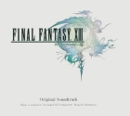
|
|
In My Own Backyard :: Review by Don
 |
Album Title: | In My Own Backyard |
| Record Label: | Square Enix | |
| Catalog No.: | iTunes | |
| Release Date: | November 28, 2007 | |
| Purchase: | Buy at iTunes |
Overview
Mitsuto Suzuki is currently a synthesizer operator for Square Enix who has worked on games such as Sigma Harmonics, Chocobo's Mysterious Dungeon: Labyrinth of Forgotten Time, and the upcoming Final Fantasy XIII. However, before joining the company he also had experience as an electronica artist, heading techno-pop unit Overrock, remixing the music of Erik Satie, and producing some Bemani compositions. Having contributed to the Square Enix Bootleg series of albums, he debuted his first solo album, entitled In My Own Backyard, with pieces from that series as well as new compositions. Though released exclusively through iTunes, it created quite a stir in the game music community. How does Suzuki tackle this electronica album and is it worth picking up?
Body
Suzuki's first album can be divided into two sections, tracks featuring vocals and those without. The album starts off with "Split," which has a nice ambient electronica feel with some subtle rock influences to it. The female vocals aren't my favorite, but the instrumental backing really helps make it more rounded and offers a particularly soothing effect. Though he may not be the best vocal artist to have worked for Square Enix, his ability to create relaxing electronica is unparalleled. Particularly impressive is how he gradually layers carefully chosen synth pads to create a warm and meditative sound.
"Sound of a Dream," on the other hand, has vocals that are a bit more tolerable. The electronica used as a backing has a very calming effect at times, while a very pop-like sound at others. In the end, it's a nice fusion of sounds and one of the better pieces on the album. "Jack Yourself" features penetrating male vocals with some rap influences. It's nevertheless also a theme that relies on a steady electronica beat. Fortunately, the beat changes in the duration of the song and the instrumental sections help salvage a pretty boring vocal and beginning section. It's still not a really strong theme, however, and is one of my least favorites on the album.
The instrumental section of the album, however, is much more soothing and accessible. "Clear" is a subtle ambient electronica theme that is very relaxing in nature. I find the piano to be a particularly nice touch as it serves to create a more tangible effect on the entire piece. I find this theme to be one of Suzuki's best on the album. "Common Note" is another soft electronica theme, but it also features some deep bass work at times. It's also a bit faster paced and offers a bit more diverse array of sounds. The subtle jazz influence is also nice and helps this one become a bit more engaging.
One of my favorite instrumental pieces is the title theme, "In My Own Backyard." As with much of the electronica on this album, it's a bit softer than what you'd hear from Supersweep or more energetic composers. Featuring some soothing synth effects, some beautiful acoustic guitar lines, and a nice steady beat, it manages to close the album quite well. Many of the other electronica pieces are also in this style, however, some like "Ray" and "Meadow" tend to use a more active inclusion of random synth effects and electronic noise. At times, they can be a bit cluttered and muddled. They aren't the worst pieces on the album, but relatively few will appreciate their creativity.
Summary
Mitsuto Suzuki's first solo album is hit or miss. I found the vocal themes to be weaker than the instrumentals, but not all the instrumentals were perfect either. In the end, this album is definitely a nice way to relax after a hard day or whilst staring at the sky, provided you at least make sure "Jack Yourself" isn't included. A lot of creativity went into it and Akira Yamaoka's comments that it inspires synaesthesia are spot on. For those looking for more engaging electronica, I suggest you go elsewhere, but for fans of I Am Robot and Proud, I think you'll find this style to be a bit similar so you might enjoy it. I know I do.

